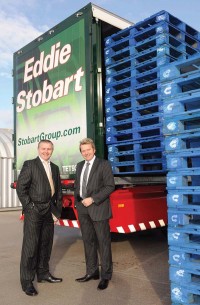 CHEP, the global leader in pallet and container pooling services, has signed a major agreement with Stobart Rail to use their new pioneering train service which runs between Spain and the UK. The weekly service, which is operated in conjunction with DB Schenker, travels the 1,100 mile route from Valencia to the Ford Dagenham railhead importing fresh and ambient Spanish produce.
CHEP, the global leader in pallet and container pooling services, has signed a major agreement with Stobart Rail to use their new pioneering train service which runs between Spain and the UK. The weekly service, which is operated in conjunction with DB Schenker, travels the 1,100 mile route from Valencia to the Ford Dagenham railhead importing fresh and ambient Spanish produce.
On the return journey, the train’s 30 containers are filled with nearly 12,000 CHEP pallets which would previously have been transported using some 30 trucks. With goods being imported into the UK on CHEP pallets, it is necessary for CHEP to export its pallets to Europe to keep its equipment pool balanced.
Eamonn Casey, CHEP’s Logistics Director for the UK and Ireland, said: “This is a ground-breaking development in the transport of produce and pallets around Europe. It is also a further endorsement of the commitment of both companies to environmental sustainability. Even at the current weekly frequency, the service will mean annual savings of 5.92 million kms of road journeys and a reduction in CO2 emissions of over 5,500 tonnes.
“In addition to CHEP pallets being sent on the return trip, they are also regularly included on the inbound journey as well. We have contracts to supply pallets to many leading Spanish fruit and vegetable growers who are now making good use of this quick and low carbon method of getting their products to market.”
The train is the first fully refrigerated service to go through the Eurotunnel and each container is monitored remotely by Stobart all the way from the pack house to the consumer. The shelf life of fresh produce is also increased as the rail journey is significantly quicker than travelling by road.
Andrew Tinkler, CEO of Stobart Group, said: “We believe this service represents a real breakthrough. We have started with one train per week but we believe that when our customers see the benefits we will soon be able to develop this into a daily service, so increasing the efficiencies and environmental benefits by a factor of five.”
“For CHEP it is now much easier and quicker for us to balance our pallet pool across UK and southern Europe, and so further improve the service to our customers,” added Casey. “Previously, surplus pallets would have had to be returned by road which was slower and also involved administrative time in finding the most cost-effective way of getting them back by truck.”
CHEP
www.chep.com.




Comments are closed.